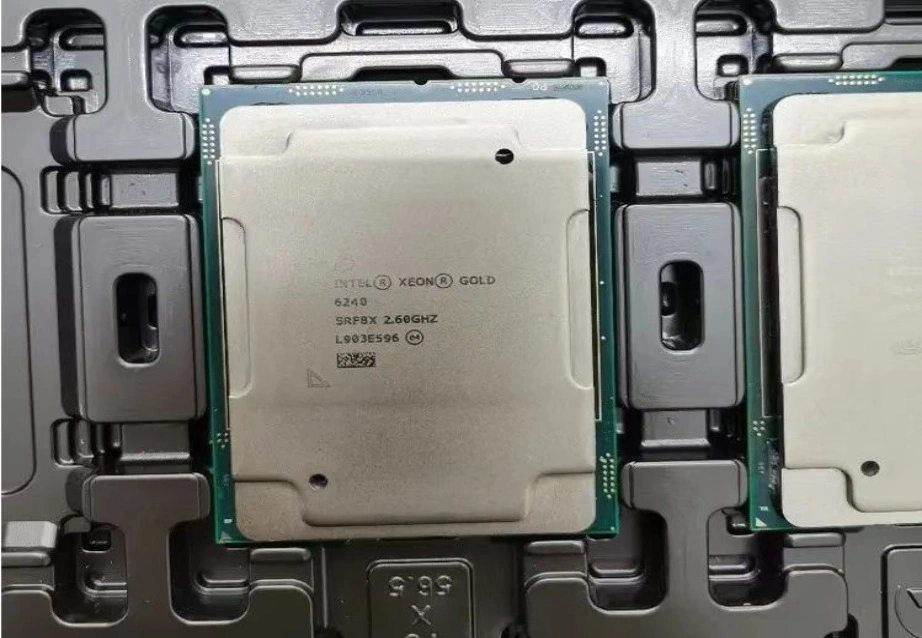Why Is CPU Selection Crucial for AI Training Servers?
What Role Does the CPU Play in AI Model Training?
The CPU in AI training servers handles key tasks. It manages data flows, memory access, and task coordination. GPUs take on the most heavy-duty math in deep learning. However, CPUs are vital for preparing large datasets, handling input/output tasks, and managing multi-threaded work. A weak CPU can slow down the whole training process. This cuts output and stretches job times.
How Do Core Count and Clock Speed Affect AI Performance?
High core counts and clock speeds matter for parallel tasks in AI work. More cores let multiple threads run at once. This helps when handling many data streams or running spread-out training jobs. For example, the Intel Xeon Gold 6240 has 18 cores and 36 threads. It offers a base clock of 2.6GHz and boosts up to 3.9GHz. This makes it fit for heavy AI tasks. Higher clock speeds also help single-threaded work. This is useful during model setup or result-checking stages.

Are Server-Grade CPUs Necessary for AI Training Tasks?
Yes, server-grade CPUs like Intel Xeon Scalable or AMD EPYC series are built for trust, growth, and memory speed. These are key for AI training servers. For instance, the HPE ProLiant DL560 Gen11 supports up to four 4th Generation Intel® Xeon® Scalable processors. Each has up to 60 cores. It also backs memory up to 16TB DDR5 RAM at 4800MT/s. These features make server-grade CPUs essential for big AI projects.
How to Choose the Best RAM Configuration for AI Training Servers?
Why Is High-Capacity RAM Essential in AI Workloads?
AI models often need to load big datasets into memory. This cuts delays from disk access. High-capacity RAM lets more data stay in memory during training rounds. For example, the FusionServer 2288H V7 supports up to 48 DDR5 DIMMs with speeds up to 5600 MT/s. This handles large datasets well. Low memory can cause frequent data swaps. This slows work a lot.
What’s the Impact of RAM Speed and Latency on Model Training?
RAM speed affects how fast data reaches the CPU or GPU. Quicker memory cuts delays during data loading and mid-step calculations. For example, the HPE ProLiant DL380 Gen11 supports DDR5 memory modules with speeds up to 5600MT/s. This ensures fast access for high-speed tasks like deep learning.
How Much RAM Do You Really Need for Different AI Projects?
The RAM needed depends on the dataset size and model type:
-
Small text or image tasks may need 64–128GB.
-
Medium models like BERT or ResNet-50 work best with 256–512GB.
-
Large models like GPT-style transformers may need over 1TB.
The HPE ProLiant DL560 Gen11 allows setups up to 16TB DDR5 ECC Registered DIMMs. This suits big enterprise projects.
What Are the Common Mistakes When Selecting CPU & RAM for AI Training Servers?
Is Overinvesting in CPU or RAM Always Better?
No, spending too much on top CPUs or extra RAM can waste money. If the hardware does not match actual task needs, resources sit unused. It’s key to balance spending with project size and expected output.
Can Mismatched Components Limit Performance Gains?
Yes, pairing a high-core CPU with slow or low memory can cause delays. Likewise, fast DDR5 RAM with an older CPU that cannot use its full speed loses benefits. Matching parts is crucial. We at Huaying Hengtong help clients check this carefully.
Why Should You Consider Workload Type Before Purchasing?
Different AI tasks have unique needs:
-
Vision tasks need high memory speed.
-
Text tasks require more memory space.
-
Learning tasks may need faster single-thread work.
Checking task types ensures the right hardware pick.
Which Popular CPUs and RAM Modules Are Suitable for AI Training Servers?
Intel Xeon Scalable Processors: Balanced Performance and Scalability
Intel Xeon Scalable processors offer a strong mix of core count, clock speed, and memory support. They suit many AI tasks. The FusionServer 1288H V7 supports up to two Intel® Xeon® Scalable processors (4th/5th Gen) with TDPs up to 385W per processor. This gives scalable power while saving energy through smart load changes.
AMD EPYC Series: High Core Count for Parallel Processing
AMD EPYC processors are known for high core counts and PCIe lane support. These are great for multi-GPU setups in deep learning. Their design offers large cache sizes and high data flow for parallel model training.
Samsung DDR5 ECC Registered DIMMs: Optimized for Server Reliability
ECC Registered DIMMs keep systems steady during long training runs. They spot and fix memory errors on their own. This is key for models running days or weeks without stops.
Micron DDR4 RDIMM: Cost-Effective Memory Solution for Mid-Range Servers
For mid-range servers with moderate tasks, Micron DDR4 RDIMMs balance cost and trust. These modules support error fixes and give enough speed for most standard machine learning jobs.

Who Is Huaying Hengtong and How Can We Help with Your AI Server Needs?
What Services Do We Offer for AI Training Server Deployments?
Huaying Hengtong. started in 2016 with a capital of 30 million yuan. We focus on sales and support for major IT brands like Dell, HPE, Lenovo, Inspur, Huawei, Super Fusion, and IBM. Our product line covers hundreds of servers, switches, desktops, laptops, and storage items. These are tailored for enterprise solutions like AI training servers.
How Do We Support You in Selecting Compatible CPU and RAM Options?
We offer full consulting services. These include analyzing needs, picking equipment based on task types, checking part compatibility (CPU-RAM-GPU), planning network setups, and providing ongoing support. Based on the core concept of customer-centricity and customer-first, we create customized solutions for customers.
Why Choose Huaying Hengtong as Your Trusted Partner in Server Solutions?
We have deep experience in sectors like government, education, business, and finance. We offer scalable IT setups for compute-heavy fields like AI. We aim to be a top IT service provider in China.
FAQ
Q: Which brand offers reliable CPUs for AI training servers?
A: Intel Xeon Scalable processors are widely trusted. They offer high core counts and work well with ECC memory in server setups.
Q: What type of RAM is best suited for AI training servers?
A: ECC Registered DDR5 DIMMs give speed (up to 5600 MT/s) and trust with error fixes. They’re ideal for long model training runs.
Q: How do I choose between AMD EPYC vs Intel Xeon processors?
A: AMD EPYC offers more cores for parallel tasks. Intel Xeon gives better support across major server brands like HPE or Huawei, available through Huaying Hengtong.
Q: Can Huaying Hengtong help me customize an AI training server?
A: Yes, we provide tailored solutions based on your needs. These cover equipment picks, technical checks, and support across North China markets.
Q: What makes Huaying Hengtong a good choice as an IT equipment supplier?
A: With over ten years of experience, we offer full IT solutions. These include server customization, hard disk wholesale, and trusted Huawei product supply.











